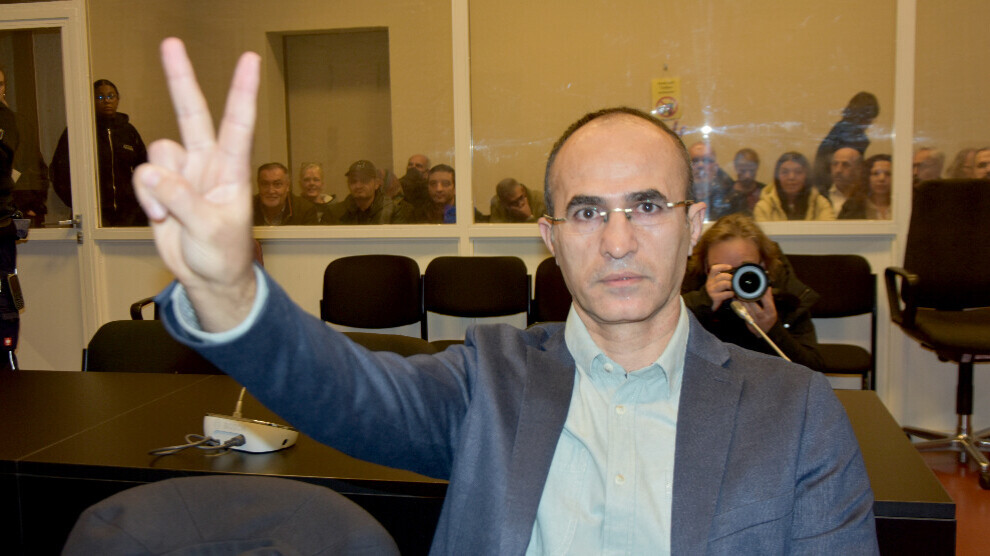Trial against Kurdish activist Kenan Ayaz begins in Germany
The trial against Kurdish activist Kenan Ayaz, who was extradited from Cyprus to Germany, has opened in Hamburg on Friday.
The trial against Kurdish activist Kenan Ayaz, who was extradited from Cyprus to Germany, has opened in Hamburg on Friday.

The trial against Kenan Ayaz began at Hamburg Higher Regional Court on Friday amid great public interest. The Kurdish activist is accused of being a member of the Kurdistan Workers' Party (PKK) under sections 129a/b of the German Criminal Code (StGB). Ayaz was arrested at Larnaca Airport in Cyprus in March 2023 on the basis of a European arrest warrant requested by the Federal Court of Justice and extradited to Germany at the beginning of June. Since then, he has been detained in Hamburg's Holstenglacis remand prison under stricter prison conditions.
At the start of the trial, the ‘Free Kenan Solidarity Committee’ called for the immediate release of Kenan Ayaz at a rally in front of the Hamburg Higher Regional Court. In a speech, Giorgos Koukoumas (AKEL), a member of parliament who travelled from Cyprus, pointed out the political background to the trial and said that Kenan Ayaz was not accused of any acts of violence. The AKEL politician reported on the great solidarity with Ayaz and the protests against his extradition to Cyprus. He called for the PKK to be removed from the EU list of terrorist organisations and expressed his full support for the Kurdish people's struggle for dignity.
The hearing was watched by numerous media representatives and dozens of other people, including Cypriot MP Koukoumas, the co-chair of the Hamburg left-wing parliamentary group, Cansu Özdemir, and former HDP MPs Selma Irmak and Nihat Akdoğan, who live in exile in Germany. Not all those interested were allowed into the court hall due to a lack of space, and queues formed outside the courtroom due to the court's poor planning.
The defendant showed the victory sign upon entering the hearing room and was greeted with standing ovations by the trial observers.
The indictment does not accuse Kenan Ayaz of committing an act of violence. The indictment is based solely on the argument that he communicated and met with a large number of people in northern Germany and North Rhine-Westphalia between 2018 and 2020 on behalf of the PKK, some of whom are also categorised as members of the PKK by German law enforcement authorities. He is also alleged to have organised legal demonstrations and rallies and participated in fundraising activities.
After the indictment was read out, the lawyers made a detailed opening statement in which the political nature of the proceedings was made clear. The defendant is expected to make a statement on the political accusations against him on 13 November. Two witnesses have been summoned for the next day of the trial on 7 November. The other hearings are scheduled for 16 November, 23 November, 24 November, 27 November, 30 November, 5 December, 7 December, 11 December, 14 December, 19 December, 20 December and 21 December 2023, each starting at 9.30 a.m.
In the opening statement, the defence lawyers Antonia von der Behrens, Stephan Kuhn and Efstathios C. Efstathiou stated the following facts, among others:
“Mr Ayaz is a political person, a political Kurd. He has suffered massive political persecution in Turkey. He has already been unjustly imprisoned twice in Turkey. He was arrested in 1993 at the age of 18, severely tortured and sentenced to 15 years in prison solely on the basis of his false and unsubstantiated statement that he had been a member of a PKK committee in Alanya for two months, of which he had to serve eleven years under the worst possible conditions. After his release, he did not leave Turkey, but took part in legal Kurdish educational work and in the election campaign of the legal Kurdish party, for which he was imprisoned again for six months and subsequently acquitted by the Turkish judiciary in 2007, but not compensated. In 2010, Mr Ayaz was charged in Turkey with alleged membership of the KCK on the basis of his educational work in Diyarbakir. He is one of 151 defendants in the main KCK trial, a pilot trial designed to criminalise and marginalise Kurdish civil society in its entirety. Although Mr Ayaz was able to flee to Cyprus and was recognised there as a political refugee, the Turkish regime is still looking for him and wants to convict him on the basis of the KCK indictment. The offences of which Mr Ayaz is accused are of a political nature.
The explanation for the fact that Kurds in Germany continue to be intensively persecuted as alleged members of the PKK as terrorists and that considerable resources are spent on this can only be that these criminal proceedings are not in Germany's domestic but in its foreign policy interests. In short, the ongoing and even increasing criminal prosecution of Kurds under Section 129b of the German Criminal Code is due to the pressure exerted by Turkey on Germany and other EU member states to prosecute alleged supporters of the PKK without restraint.
The proceedings here are therefore originally political, as they are based on a political decision, the authorisation to prosecute. Without this decision, Mr Ayaz would not be in the dock today. Not only is the decision to prosecute Mr Ayaz a political one, but also the accusation for which he is being prosecuted is that he has been politically active for certain political goals in a legal manner. This no longer has anything to do with ordinary criminal proceedings and this makes it very difficult for Mr Ayaz to defend himself against the accusations.”